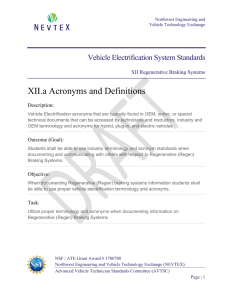Vehicle Electrification Systems Standards: Regenerative Braking Systems

Vehicle Electrification Systems Standards Curriculum Description:
The Vehicle Electrification Systems Standards curriculum is provided by the Northwest Engineering and Vehicle Exchange (NEVTEX) and was developed by Central Oregon Community College (COCC) and Rio Hondo College (RHC). COCC and RHC worked together "to develop curriculum and training standards for technicians in hybrid electric vehicle (HEV), electric vehicle (EV), and Fuel Cell (FC) vehicle systems." This curriculum was developed with the intention of addressing industry needs by partnering with industrial and educational representatives to obtain input and assistance to develop:
- new approaches to prepare an advanced technologies workforce,
- licensure procedures and policies to ensure the safety of technicians, their employers, and clients, and
- collaboration between educational and industrial partners in the development of new standards and practices.
The Vehicle Electrification Systems Standards are divided into 11 topics. This section of the standards covers regenerative braking systems. The other 10 topics and a Master Acronym and Definition list are available to view separately.
Regenerative Braking Systems Description and Contents:
This section of the standards includes the following supporting document and lesson plan: Xll.a Acronyms and Definitions and Xll.b Overview of Regenerative Braking Systems. The 13-page acronyms and definitions document includes a number of terms that are used in the included lesson plan. The 4-page lesson plan includes a description, student tasks, and learning objectives and outcomes.
After completing the lesson, "students shall be able to articulate how the mechanical, hydraulic, electrical, and electronic systems operate to permit and control the Regen Braking System, and how to test, analyze, and service the Regen Braking System when provided with test equipment."
About this Resource


Comments